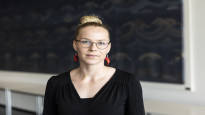Master of Science in Administration Marjukka Mikkonen examines gender equality in leadership positions in sports in his dissertation, which is being reviewed at the Faculty of Management and Economics of the University of Tampere.
One observation, especially from the point of view of the development of equality, emerges in the dissertation that the sports sector should focus on activities that aim to change the operating culture and structures.
– This requires the collective and parallel actions of many different actors. Concretely, they could be, for example, training on the themes of equality and equality for everyone working in sports organizations, not just for women.
Mikkonen says that this could be a step in the direction that we could change as individuals, and not so that we train women suitable for existing positions.
– Individuals make organizations and we need an external stimulus and self-reflection in order to learn to change our ways of working, continues Mikkonen, whose path to becoming a researcher has passed through many football fields.
Mikkonen, who traveled from Iisalmi and Kuopio to Tampere via Åland, Sweden and Norway, was born in Iisalmi in 1993. He got excited about football when his brother played in elementary school.
Klubi-36 offered the girls good coaching and the B-girls’ team advanced to the age group SM series, from where Marjuka’s road led to Kuopio as a high school student. The games in the women’s league started in Kuopio Palloseura as a goalkeeper.
Next, football took Marjuka to Åland, where it took a year and a half until she applied to read administrative sciences in the education program offered by the University of Tampere.
There was the opportunity to complete half a year of studies in addition to Tampere, both at KTH in Stockholm and Agder University in Kristiansand.
– I was able to continue playing and training alongside my studies. In Stockholm I trained in AIK and in Norway I played in Grimstad while writing my Master’s thesis on gender equality in football organizations. After graduating, I became interested in management and organizations, but also wanted to become a researcher, so I applied for a postgraduate study permit in Tampere.
An international football career has made it possible to examine the differences in sports management in different countries. My own experiences as a player remind me of how much more resources women’s football had during her time playing in Norway.
– Financial resources and better training conditions brought a feeling of equality and created equality in the sense that even as a woman you could live a professional life. It was possible in Norway for a much wider group than, for example, in Finland, and it shows in the success.
From the point of view of management, the difference arises from the fact that more money can be allocated to equality work in Norwegian football. Thanks to it, more and more young women can play professionally and they form a stronger bond with the sport.
– Maybe as a result they want to work for the sport even after their sports career, for example to go to work in a sports association. This creates a longer continuum of activity in sports.
The partial investigation also revealed that a woman as a football manager in Norway was not a big surprise, because the country’s football association had previously had a female general secretary.
– The situation there is no longer new and strange, as it might be in Finland. That’s how the interviewees often described it.
Numbers do not guarantee equality
In Finland, inequality in sports management positions is shown both in statistics and in experiences of gender-based discrimination and inappropriate behavior.
According to the most recent statistics, 86 percent of the presidents of sports and sports organizations and 65 percent of the operational managers are men.
Although numerous policy measures have been taken over the years to develop equality and equality, the results do not confirm that development has particularly taken place.
– In Finland, there is perhaps too much focus on numbers, and on the fact that a certain number of women must be on boards, and only then will equality be created.
According to Mikkonen, there is no simple and easy solution to change.
– I would pay particular attention to the level of implementation, i.e. if there is a political goal and the policy actions developed for it, then their effectiveness should also be examined.
– If non-governmental organizations that receive state aid in sports are required to have an equality and equality plan, then it is certainly possible to develop an examination of the effectiveness of the plans. Maybe you also need a stick and not just a carrot.
Appropriate or valid?
It is also often said that a woman brings a new way of thinking, for example, to the board work of a sports organization. So is thinking a gender issue?
– The perception of a “good guy” suitable for government is gendered and is based on thoughts about masculine qualities that qualify for the position, for example a strong competitive sports background in a sport traditionally perceived as masculine. Often a man fits that mold better than a woman, because usually men have cast that mold.
Mikkonen’s doctoral dissertation’s partial research on the board work of sports federations confirms that the women and men working in them think about things very much the same way.
– This is a shame from the point of view of organizations, because this makes the ability to innovate, new ideas and serving different people difficult. I believe that people from different backgrounds and with different experiences and identities bring broader perspectives to sports management and decision-making, reflects Mikkonen.
Marjukka Mikkonen’s dissertation ceremony on 25 August 2023 can follow through this link.
The professor of management acts as the opponent Janne Tienari From projects. The custodian is a professor of administrative science Jari Stenvall from the Faculty of Management and Economics.
